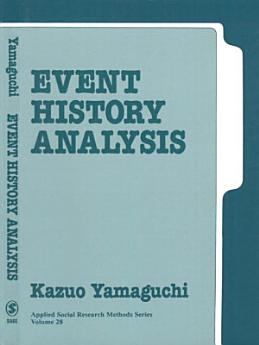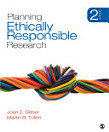Event History Analysis
Kazuo Yamaguchi
ກ.ລ. 1991 · SAGE Publications
4,0star
2 ຄຳຕິຊົມreport
ປຶ້ມອີບຸກ
182
ໜ້າ
family_home
ມີສິດ
info
reportບໍ່ໄດ້ຢັ້ງຢືນການຈັດອັນດັບ ແລະ ຄຳຕິຊົມ ສຶກສາເພີ່ມເຕີມ
ກ່ຽວກັບປຶ້ມ e-book ນີ້
In a manner similar to many other titles within the Applied Social Research Methods Series, this 182-page book thoroughly covers many of the specific methodological hurdles encountered in implementing event history analysis (EHA). The Applied Social Research Methods Series′ . . . is the result of careful subject selection. . . . Consistent with the practical orientation of the book, each of the application sections provides useful insights into data structure problems and programming notes. . . . Kazuo Yamaguchi′s insightful review of problems in structuring EHA models is useful for those contemplating life-course research. . . . We strongly recommend its inclusion in the libraries of marketing researchers and its inclusion on suggested reading lists of graduate research method seminars. --Journal of Marketing Research "This book, which is part of Sage Publications′ Applied Social Research Methods Series, is a practical guide for those interested in using event history analysis. . . . The book′s strength is that it is well written and easy to understand. Even those with limited statistical backgrounds can follow the discussion and the systematic progression from the simpler to the more complex models (although the author provides ample references for those wanting a more rigorous discussion). . . . Upon finishing the book, I found myself wondering about specific accounting questions that might be addressed using event history analysis. There are many, and in fact, most issues can be recast in an events framework. . . . In sum, I recommend this book to anyone wanting to use event history analysis whether to apply to new research questions or to provide a fresh look at old questions." --The Accounting Review "A significant introduction to the event-history literature that provides the background to implement this difficult methodology successfully and that can be supplemented with other, more advanced texts. It will undoubtedly become a prized text among students and a valuable reference for the research community." --Contemporary Sociology As a research tool event history analysis has recently become a key technique for researchers, professionals and students in a wide range of disciplines. However, despite this increasing interest, few resources exist which clearly examine this technique. Now, Event History Analysis provides a systematic introduction to models, methods and applications of event history analysis. Kazuo Yamaguchi emphasizes "hands on" information, including the use and misuse of samples, models, and covariates in applications, the structural arrangement of input data, the specification of various models in such computer programs as SAS-LOGIST and SPSS-LOGLINEAR, and the interpretation of parameters estimated from models. This timely book also offers such significant topics as missing data, hazard rate, Cox′s partial likelihood model, survivor function, and discrete-time logit models for both one-way and two-way transitions. Event History Analysis is essential for researchers, professionals and students of public health, sociology, labor economics, political science, and organization studies.
ການຈັດອັນດັບ ແລະ ຄຳຕິຊົມ
4,0
2 ຄຳຕິຊົມ
ກ່ຽວກັບຜູ້ຂຽນ
Professor Yamaguchi is interested in statistical models for social data and mathematical models for social phenomena, the life course, rational choice, exchange networks, stratification and mobility, demography for family and employment, process of drug use progression. His current research focuses on models of exchange networks and women′s occupational careers in Japanese society.
ໃຫ້ຄະແນນ e-book ນີ້
ບອກພວກເຮົາວ່າທ່ານຄິດແນວໃດ.
ອ່ານຂໍ້ມູນຂ່າວສານ
ສະມາດໂຟນ ແລະ ແທັບເລັດ
ຕິດຕັ້ງ ແອັບ Google Play Books ສຳລັບ Android ແລະ iPad/iPhone. ມັນຊິ້ງຂໍ້ມູນໂດຍອັດຕະໂນມັດກັບບັນຊີຂອງທ່ານ ແລະ ອະນຸຍາດໃຫ້ທ່ານອ່ານທາງອອນລາຍ ຫຼື ແບບອອບລາຍໄດ້ ບໍ່ວ່າທ່ານຈະຢູ່ໃສ.
ແລັບທັອບ ແລະ ຄອມພິວເຕີ
ທ່ານສາມາດຟັງປຶ້ມສຽງທີ່ຊື້ໃນ Google Play ໂດຍໃຊ້ໂປຣແກຣມທ່ອງເວັບຂອງຄອມພິວເຕີຂອງທ່ານໄດ້.
eReaders ແລະອຸປະກອນອື່ນໆ
ເພື່ອອ່ານໃນອຸປະກອນ e-ink ເຊັ່ນ: Kobo eReader, ທ່ານຈຳເປັນຕ້ອງດາວໂຫຼດໄຟລ໌ ແລະ ໂອນຍ້າຍມັນໄປໃສ່ອຸປະກອນຂອງທ່ານກ່ອນ. ປະຕິບັດຕາມຄຳແນະນຳລະອຽດຂອງ ສູນຊ່ວຍເຫຼືອ ເພື່ອໂອນຍ້າຍໄຟລ໌ໄໃສ່ eReader ທີ່ຮອງຮັບ.




